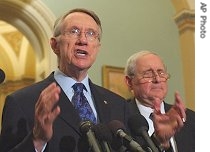2007年VOA标准英语-US Congress, Poised for Month-Long Break, Looks(在线收听)
Capitol Hill
04 August 2007
The U.S. House of Representatives and Senate are completing legislative work before beginning their month-long recess. As their session drew to a close, Republicans and Democrats blamed each other for not accomplishing more than they did, and looked forward to next month, when Iraq and budget battles are expected to dominate. VOA's Deborah Tate reports from Capitol Hill.
When Democrats took control of Congress following last November's elections, they vowed to bring change to Capitol Hill.
Seeking to distance themselves from what they called the do-nothing Republican-led Congress in the last session, Democrats promised to implement an ambitious agenda.
The Congress did pass a bill to implement the rest of the 9/11 Commission recommendations aimed at preventing the kind of terrorist attack that occurred on September 11, 2001, a measure President Bush signed into law Friday.
Congress also passed a sweeping lobby reform bill that bars lawmakers from accepting gifts from lobbyists and requires them to provide details about campaign donations raised by lobbyists.
 |
| Senate Majority Leader Harry Reid (file photo) |
"We indicated that because of the culture of corruption that had infected Washington that we were going to change that, and change it, we did," he said. "The bill that is now on its way to the president is the most sweeping lobbying and ethics reform in the history of our country."
But on budget matters, the House and Senate have yet to act on most of the 13 spending bills that must be passed by September 30 to fund the government.
Republicans are now using the "do nothing" label on the Democratic-led Congress. They note public opinion polls that show a majority of Americans are dissatisfied with the Democratic-led House and Senate.
Senator Mitch McConnell of Kentucky is the Senate's top Republican:
"They have managed to achieve an astonishing thing, which is to have the lowest approval ratings anyone can find for Congress in history, and have done it in a record short period of time for about seven months," he said.
McConnell criticized Democrats for wanting to spend more than President Bush had requested in his budget, and predicted that Mr. Bush would be more than willing to use his veto on spending bills if the Democratic majority does not comply with his request.
"The president will not sign bills in excess of his cumulative number, and we can either bring in the bills at an appropriate budget amount, or we will have a series of vetoes here," he added.
Democrats argue they have fiscally responsible budget rules in place, and they note that the Republican majority in the last Congress failed to pass a number of spending bills.
Republicans accuse Democrats of being more interested in conducting what they say are overreaching investigations into the Bush administration than on producing legislation.
Democrats defend their probes into the administration's controversial wiretap program and its decision to fire federal prosecutors, saying they are conducting their oversight responsibilities, which the last Republican majority failed to do.
Democrats blame Republicans for obstructionism and wanting to derail legislation. Their hopes for a major overhaul of the nation's immigration system were dashed when Republicans blocked the bill, despite President Bush's support of the measure.
Senate Democrats were frustrated when Republicans blocked proposed timelines for troop withdrawals from Iraq, even though a narrow majority in the chamber backed the idea.
Majority Leader Reid vowed to bring up the issue again next month. He pounded the podium for emphasis.
"We are going to continue our push to change course in the war in Iraq," added Mr. Reid.
Noting opinion polls showing a majority of Americans oppose the Iraq war, Reid hopes more Republicans will back a timetable for redeployment from Iraq after they have had a chance to meet with constituents in their home districts over the course of the next several weeks.
The debate on Iraq next month is expected to occur about the same time the top U.S. commander in that country, General David Petraeus, and U.S. Ambassador Ryan Crocker, are to brief Congress about the progress of the current troop surge strategy.